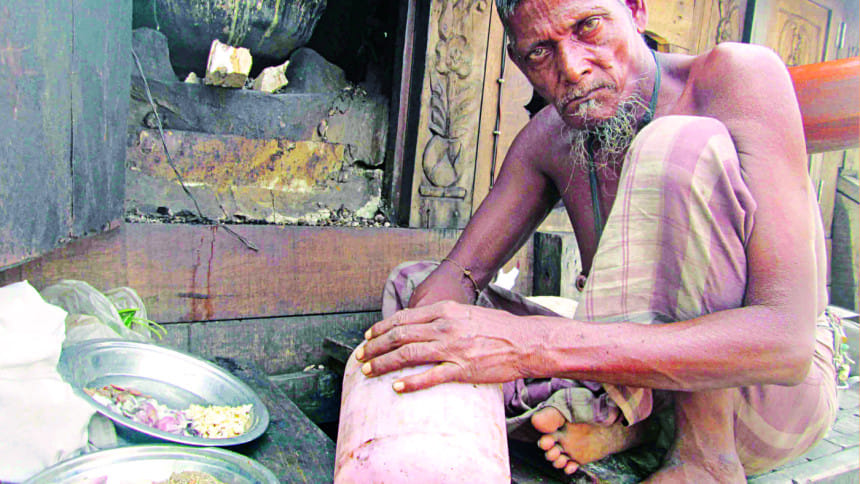The lure of the sea, a lifelong debt trap for fishermen

When in rough weather the waves rise up, it can take all a man's strength and then some for a fisherman to overcome. There's wit, skill and experience in sea fishing, and beyond that prayer and perhaps a little luck… The open sea: it's no place for an octogenarian.
But for Taiyab Ali Sarder of Chitholiya village in Pirojpur Sadar upazila, regularly returning to the sea in his twilight years is the only option. "There's none to bear our family's expenses," he says.
It's understatement. Although the family is landless, modest daily expenses could potentially be managed in safer, dry-land ways. It's rather the need to repay advance loan money called dadan to his master, the boat owner, which chains Sarder to the sea. His story is not unique. Not only in Pirojpur but all along the Bangladeshi coast most fishermen are entrapped in an endless debt cycle. Theirs are the lives of virtual slaves.
Arrangements vary. Sometimes fish wholesalers grant loans to boat owners at the beginning of a season to fund expeditions, on the condition that each catch can only be sold to that wholesaler, a practice that undermines the ability of both boat owner and fisherman to seek optimal rates on the open market.
Sometimes wholesalers themselves own boats; alternatively boat owners enter into share arrangements with fishermen, often giving loans to insolvent fishermen before a boat's departure to cover family living expenses. When a trawler returns from the sea, the boat owner's expenses are deducted first.
While many a poor fisherman has embarked upon their career driven by dreams of improving the lives of their families, few succeed. Fish catches are hardly reliable. Rather, when there are not enough fish the fishermen have no choice but to take additional loans from boat owners in order to sustain their families until the next voyage. In this way they become debt entrapped.
"Our masters give us Tk 2000 before going to sea for family expenses," says Md Jamal Howlader, a fisherman from Pirojpur's Bhandaria upazila. "Because we don't always get a good catch, step by step our debts increase. Fishermen here owe up to Tk 40,000 to their masters and it's impossible to repay."
"If I want to change profession," says fisherman-of-twenty-years Nur Ali Howlader, of Badur village in Pirojpur Sadar upazila, "I will have to repay the dadan money which I will never be able to do." In addition to his sizeable debts, Howlader has a nine-member family to support.
"Fishing is the only work I know," says Azizul Pashari, 22. "I cannot change my profession easily." Even at this young age, Pashari owes his master Tk 18,000.
In the hope of ridding themselves and their families from the curse of poverty, insolvent men head to sea. They risk mishap, storm and cyclone. Many have a tale or two to tell of attacks by pirates. But instead of changing their fates for the better, the lot of the fisherman enslaves them.
In Bangladesh, a fisherman's reward for determination, hard work and fortitude is most often permanent indebtedness, with loans never repaid prior to a fisherman's death.
In order to ensure a fisherman's rewards are more commensurate with their efforts, the country's fishing sector is crying out for reform. Better government regulation and enforcement might play a role. NGOs could assist by offering flexible loans and explore ways of facilitating fishermen to collectively purchase their own vessels. Retailers and consumers can help by preferring fair-trade sea fish caught in circumstances of more progressive business models, in the same way that supermarkets already pride themselves in offering chemical-free fresh produce.
It's a big challenge but change must come so that one day all Bangladeshis can wake to a morning when no octogenarian is compelled to head out onto the high seas. Only on such a day can Bangladeshis be truly proud of their fishing industry… even the fish will surely taste better.
Sarder still recalls his first trip to sea at age 20, more than sixty years ago. Back then, like many he believed a risky fishing expedition could bring a life-changing windfall. But nowadays, too old to haul nets he works as a cook on the FB Maa Ganga fishing boat. His family is settled on a kindly neighbour's land. He's worried that due to his debts his youngest daughter, now 16, will never marry.
"I have no son who will repay my dadan," says Sarder, despondently. "So I go to sea again and again in the hope of repaying." He currently owes Tk 25,000.

 For all latest news, follow The Daily Star's Google News channel.
For all latest news, follow The Daily Star's Google News channel. 



Comments